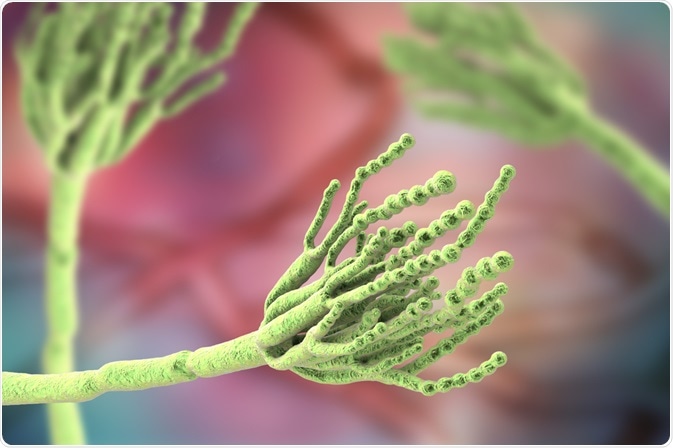Penicillins belong to a class of antibiotics referred to as beta-lactams, which are generally used to fight bacterial infection.
The drugs work by inhibiting the cell wall synthesis of bacterial cells, weakening the peptidoglycan layer found within the bacterial wall.
 Fungi penicillium were used for the production of the first penicillin antibiotic. Image Credit: Kateryna Kon / Shutterstock.com
Fungi penicillium were used for the production of the first penicillin antibiotic. Image Credit: Kateryna Kon / Shutterstock.com
Penicillin allergy refers to situations when the immune system reacts abnormally to penicillin.
This allergy occurs because the immune system has previously mistaken penicillin for a harmful substance (allergen) and produced antibodies against it, a process referred to as sensitization.
The next time a sensitized person takes penicillin, those antibodies signal the drug for attack by the immune system. A variety of chemicals are then released that cause the symptoms and signs of allergy.
If a person has had an allergic reaction to one form of penicillin, it is recommended that they avoid all classes of penicillin antibiotics due to the risk of allergic reaction. Nevertheless, other beta-lactam antibiotics may be used instead with caution.
In addition, the fact that a person has experienced an allergic reaction once does not necessarily mean they will also react in the same way in the future.
Risk factors
Although anyone can develop a penicillin allergy, some of the factors that make this more likely include the following:
- A history of other allergies such as hay fever and allergies to food or another drug
- A family history of allergy
- Some illnesses that are often associated with allergy to drugs such as HIV infection or Epstein-Barr virus
Symptoms of penicillin allergy
The signs and symptoms of penicillin allergy usually occur shortly after taking the medication and may include itching, hives, skin rashes, fever, swelling, difficulty breathing, runny nose and watery eyes.
The most severe form of reaction is anaphylaxis, which affects various areas of the body and can be life-threatening. The signs and symptoms of this reaction include the following:
- Tightened airways causing difficulty breathing
- Stomach cramps
- Nausea and vomiting
- Diarrhea
- Rapid or weak pulse
- Dizziness
- Fall in blood pressure
- Seizure
- Loss of consciousness
In some cases, symptoms occur days or weeks after taking the medication and may continue for some time after a person has stopped taking the drug. Examples of these reactions include the following:
- Drug-induced anemia, where the production of red blood cells is reduced leading to arrhythmia, fatigue, and difficulty breathing
- Serum sickness, which can cause rashes, fever, pain in the joints, nausea and swelling
- Nephritis or swelling of the kidneys, which can lead to uremia, concussion, fever and general swelling
- Drug reaction with eosinophilia and systemic symptoms (DRESS), which causes high white blood cell counts, rashes, general swelling and recurrence of dormant hepatitis infection
Penicillin skin sensitivity test
In cases where a penicillin allergy is suspected, an immunologist or allergist usually recommends a penicillin skin sensitivity test to help determine whether it is safe to use penicillin.
The whole procedure usually takes approximately one hour (two hours if coupled with the optional oral challenge), which includes the time required to see whether a reaction develops after testing.
This test involves pricking the skin with a needle and injecting an attenuated form of the drug under the skin. If a person is allergic, they will develop a bump in the area where the drug was applied.
A positive result suggests the presence of IgE antibodies to the drug and immediately excludes its use and the use of other penicillins. However, the diagnosis of penicillin allergy is only confirmed in a minority of patients claiming certain allergic reactions, especially when parents report their children’s history.
Penicillin Allergy: Evaluation and Testing
Management and treatment
A mild allergic reaction to penicillin may be treated with an antihistamine, which relieves uncomfortable symptoms such as itching and redness of the skin.
In some cases, a person may be treated with oral or injected corticosteroids. Anaphylaxis, however, requires emergency treatment with epinephrine to prevent cardiac collapse and maintain blood pressure.
If a patient has a drug allergy confirmed, they should ensure they inform their doctors of the allergy and the symptoms they have experienced. They should ask about which drugs to avoid and alternative drugs they can use that will not cause a reaction. They should also wear a medical alert necklace or bracelet detailing the allergy.
In cases where there is no suitable alternative treatment available, people sometimes undergo what is referred to as penicillin desensitization (in the hospital setting), where they are administered the drug in increasing amounts until the required dose can be tolerated, with minimal side effects.
References
Further Reading
Last Updated: Dec 30, 2022